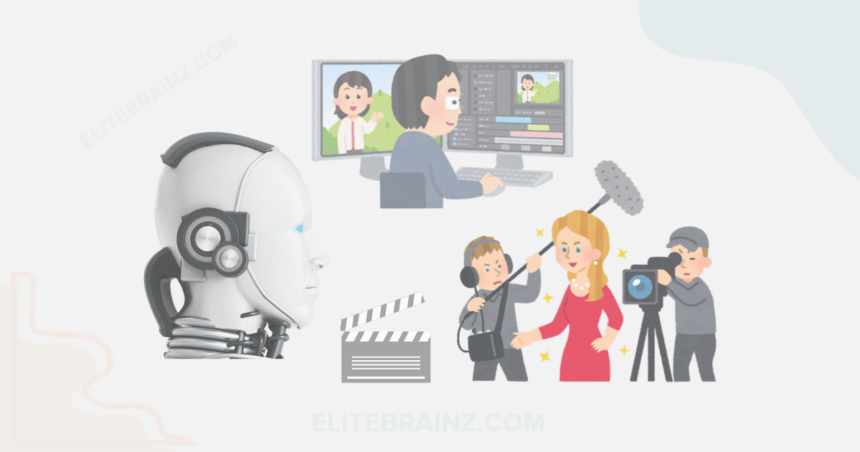Artificial Intelligence (AI) is no longer a futuristic concept but a transformative force across industries, including filmmaking. From pre-production to post-production, AI is reshaping the way movies are made, enhancing creativity, efficiency, and viewer experience. Filmmakers are leveraging AI tools to streamline workflows, create realistic visual effects, and even assist in storytelling. Here’s how AI is playing a pivotal role in modern-day filmmaking.
- Streamlining Pre-Production Processes
- Enhancing Visual Effects (VFX)
- Transforming Post-Production
- Revolutionizing Storytelling
- Personalizing Viewer Experience
- AI in Casting and Talent Management
- Real-Time Feedback During Filming
- Ethical and Creative Considerations
- Democratizing Filmmaking
- The Future of AI in Filmmaking
Streamlining Pre-Production Processes
AI simplifies pre-production tasks, such as script analysis, budgeting, and scheduling. AI-powered software can analyze scripts to identify locations, characters, and props required, helping production teams plan more efficiently.
Key Benefits:
- Automated script breakdowns save time and reduce manual errors.
- AI tools optimize shooting schedules by analyzing weather patterns, location availability, and actor commitments.
Why It Matters:
These efficiencies allow filmmakers to focus more on creative aspects rather than logistical challenges.
Enhancing Visual Effects (VFX)
AI is revolutionizing visual effects by automating complex tasks like rendering, object tracking, and image enhancement. AI algorithms can analyze vast amounts of data to create stunning visuals that were once labor-intensive.
Examples of Use:
- AI is used to generate hyper-realistic characters, landscapes, and animations.
- Deep learning enables the creation of lifelike facial expressions and movements, making CGI characters more believable.
Impact on Filmmaking:
The use of AI in VFX not only reduces production time but also lowers costs, making high-quality effects accessible to smaller studios.
Transforming Post-Production
Post-production is one of the most labor-intensive stages of filmmaking, involving editing, sound design, and color grading. AI tools are now being used to speed up these processes while ensuring precision.
Applications:
- Editing: AI algorithms can automatically sort through hours of footage to identify the best takes, significantly reducing editing time.
- Sound Design: AI can enhance audio quality, remove unwanted noise, and even generate sound effects that align perfectly with visuals.
- Color Grading: AI tools analyze visual styles and apply consistent color tones across scenes, ensuring a seamless look.
Why It Matters:
Filmmakers can achieve professional results in less time, allowing them to meet tight deadlines without compromising quality.
Revolutionizing Storytelling
AI is being used to assist in scriptwriting and plot development. By analyzing data from successful films, AI can provide insights into what elements resonate with audiences.
Applications:
- AI tools suggest plot points, character arcs, and dialogue that align with audience preferences.
- Machine learning models analyze trends to predict which genres and storylines are likely to succeed.
Impact:
While AI cannot replace human creativity, it serves as a powerful tool for brainstorming and refining ideas, enabling writers to craft more compelling narratives.
Personalizing Viewer Experience
AI is also influencing how movies are distributed and marketed. Streaming platforms use AI algorithms to recommend films based on viewer preferences, ensuring a personalized experience.
AI in Marketing and Distribution:
- Data-driven insights help studios identify target audiences and develop tailored marketing campaigns.
- Predictive analytics can forecast box office performance, aiding decision-making in production and distribution.
Why It Matters:
By understanding audience behavior, filmmakers can create content that resonates deeply, leading to higher engagement and profitability.
AI in Casting and Talent Management
AI is even being used in the casting process. Tools analyze an actor’s previous performances and match their skills with the requirements of a role.
Applications:
- AI can simulate how an actor might perform in a role, aiding directors in making informed casting decisions.
- It helps talent managers identify emerging actors who align with current industry trends.
Impact:
This technology ensures that casting decisions are not only creative but also strategic, enhancing the overall quality of a film.
Real-Time Feedback During Filming
AI-powered tools provide real-time feedback on various aspects of production, such as lighting, framing, and performance.
How It Works:
- AI analyzes scenes on set to identify technical or continuity issues.
- Directors can receive immediate suggestions for improvement, ensuring a smoother production process.
Why It Matters:
This reduces the need for costly reshoots and ensures that every scene meets the intended vision.
Ethical and Creative Considerations
While AI offers numerous benefits, it also raises ethical and creative questions. The use of AI-generated actors or scripts may blur the line between human and machine creativity. Additionally, over-reliance on AI could potentially stifle originality.
Balancing Act:
- Filmmakers must strike a balance between using AI as a tool and preserving the human touch in storytelling.
- Ethical guidelines are essential to ensure fair representation and avoid misuse of AI-generated content.
Democratizing Filmmaking
AI is making filmmaking more accessible to independent creators by lowering costs and providing tools that were once exclusive to major studios.
Examples:
- Affordable AI-powered editing software enables small teams to produce professional-quality films.
- AI tools allow indie filmmakers to experiment with VFX and animation without massive budgets.
Why It Matters:
This democratization fosters creativity and diversity in the film industry, giving a voice to underrepresented creators.
The Future of AI in Filmmaking
As AI continues to evolve, its role in filmmaking is expected to expand further. Emerging technologies like generative AI could enable entirely new forms of storytelling, blending human creativity with machine innovation.
What Lies Ahead:
- AI-driven interactive films where viewers can influence story outcomes.
- Virtual production sets powered by AI to create immersive environments.
- Advanced AI tools that assist directors in real-time creative decision-making.
Why It Matters:
The future of filmmaking lies in the harmonious collaboration between human vision and AI capabilities, pushing the boundaries of what’s possible.
Conclusion: AI is revolutionizing filmmaking, offering tools and techniques that enhance creativity, efficiency, and audience engagement. While it cannot replace the artistry and emotional depth of human creators, AI serves as a powerful ally in bringing stories to life in new and innovative ways. As technology continues to advance, the possibilities for AI in filmmaking are boundless, promising a future where creativity knows no limits.










